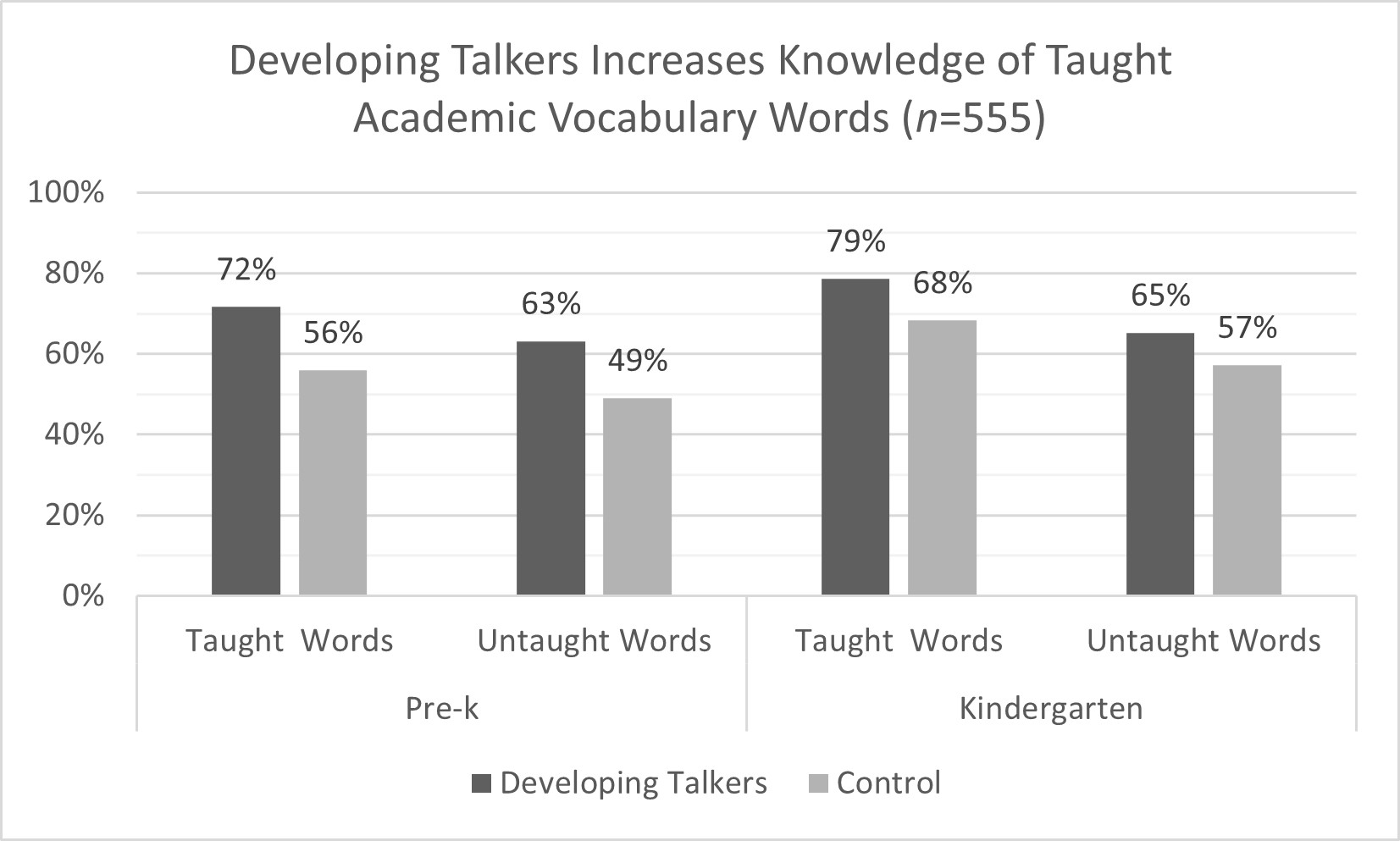Iterative Design and Pilot Testing of the Developing Talkers Tiered Academic Language Curriculum for Pre-Kindergarten and Kindergarten
Tricia A. Zucker, María S. Carlo, Susan H. Landry, Saba S. Masood, Jeffrey M. Williams, Vibhuti Bhavsar
Can Developing Talkers improve academic vocabulary?
Yes, according to a rigorous study conducted in Texas with young students who were mostly English learners (ELs, 63%). Students who participated in a 26-week shared reading program, which taught academic vocabulary and asked inferential comprehension questions, learned more sophisticated words compared with students who did not (see bar chart below). This study shows that an intervention can cause children as young as pre-kindergarten (pre-k) and kindergarten to learn more academic words. This extends past research on direct instruction to academic level words. Developing academic level language in the earliest grades aligns with modern learning guidelines that view rigorous classroom discourse as foundational to college and career readiness.

How to read this chart: This chart shows pre-k students who experienced Developing Talkers lessons learned 72% of a sample of words compared to 56% for control students, for an effect of 16 percentage points. These students also knew more untaught words at posttest. The pattern of findings is the same for K students. Note that tested words were equated for difficulty.
Why might schools need supplemental language curricula?
Core curricula vary in the extent to which they support academic vocabulary words and challenging levels of classroom discourse. The Developing Talkers curriculum supplement can be layered into any existing program to teach sophisticated vocabulary with visual aids, small-group extension activities, and supports for ELs such as cognate instruction. This supplement provides a heuristic for teachers to responsively scaffold language for all learners to successfully discuss sophisticated topics such as emotions, cognition, judgments, causal explanations, or predictive inferences. For more information on how to use the Developing Talkers approaches in any shared book reading experience, see this academic vocabulary article or this open-ended questioning article.
How did we do this study?
These findings come from an experimental pilot study. All pre-k and kindergarten classrooms providing mostly English instruction within a district were eligible. 60 classrooms were randomly assigned to groups (the program group or a waitlist group - the “control” group in the bar chart). This randomization means that differences in outcomes for Developing Talkers students and the control group are likely due to teachers’ delivery of the supplemental curriculum. The sample included 555 students enrolled in these classrooms in the 2015-16 school year. Data sources included archival district measures and a curriculum-based measure that assessed receptive vocabulary knowledge for a subsample of 30 taught words and 11 untaught, exposed words. We did not find group differences on the archival measures. It is important to note that we do not know from this pilot study if this program impacts students’ broader language skills.
For more info about the Developing Talkers curriculum visit here.
Full Article Citation:
Tricia A. Zucker, Maria S. Carlo, Susan H. Landry, Saba S. Masood-Saleem, Jeffrey M. Williams & Vibhutibala Bhavsar (2019) Iterative Design and Pilot Testing of the Developing Talkers Tiered Academic Language Curriculum for Pre-Kindergarten and Kindergarten, Journal of Research on Educational Effectiveness, 12:2, 274-306, DOI: 10.1080/19345747.2018.1519623
